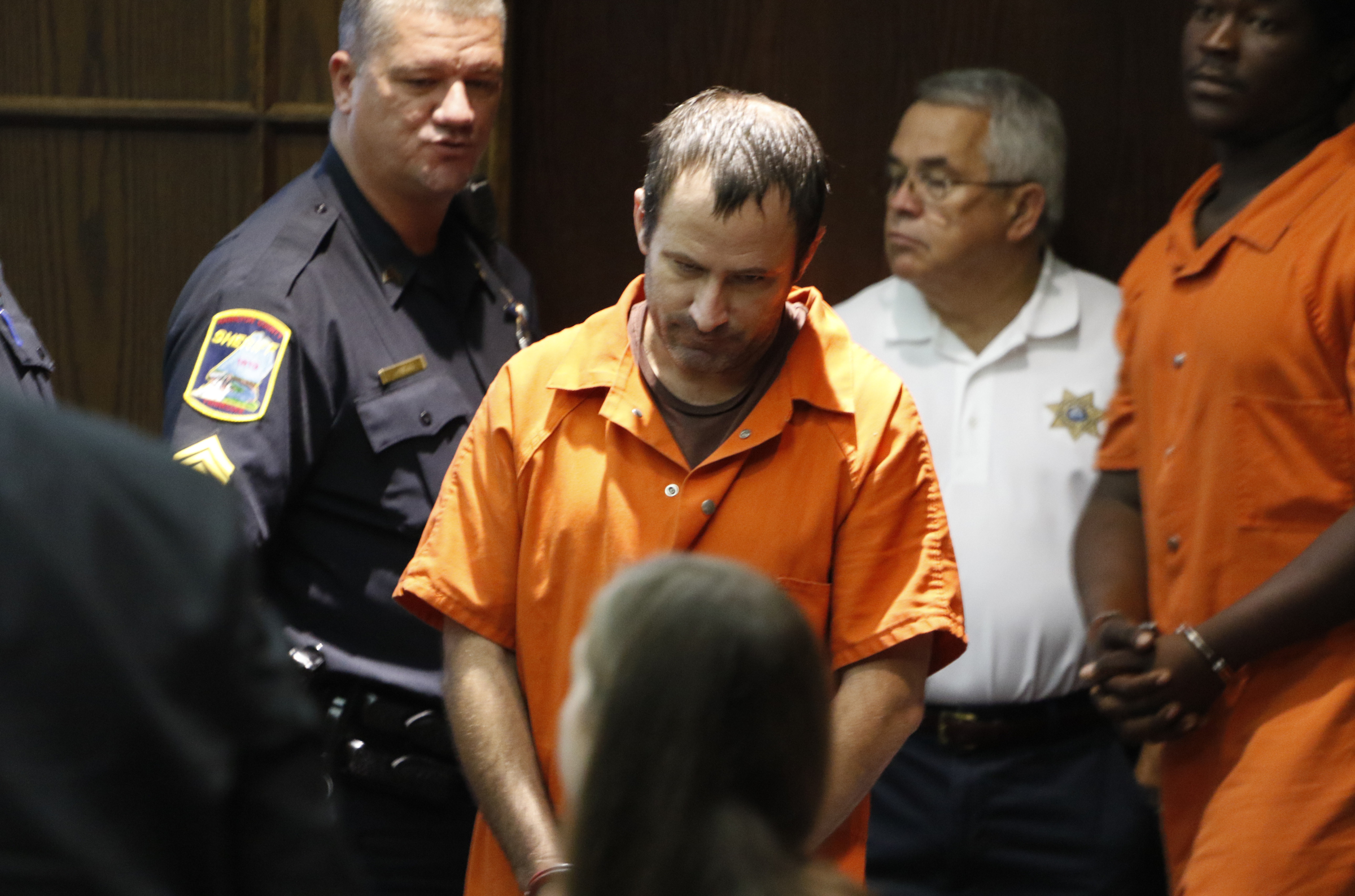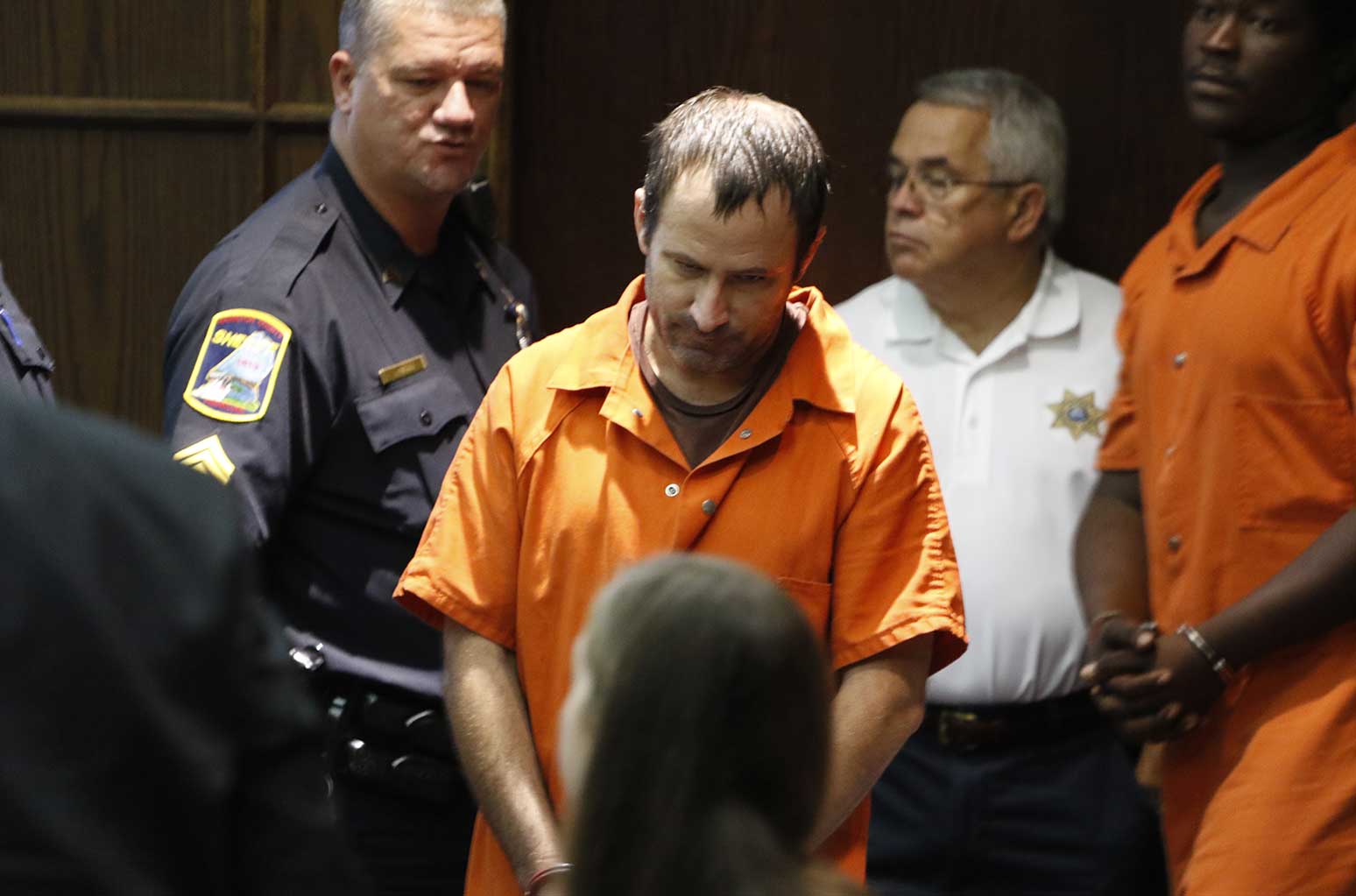 Benjamin Brewer, the truck driver who failed to stop his tractor-trailer on Interstate 75 and caused a wreck that killed six people on June 25, is brought out of custody to appear before Judge Don Poole for arraignment while at the Hamilton County Criminal Court's building in Chattanooga, Tenn., on September 11, 2015. Staff Photo by Dan Henry / The Chattanooga Times Free Press.
Benjamin Brewer, the truck driver who failed to stop his tractor-trailer on Interstate 75 and caused a wreck that killed six people on June 25, is brought out of custody to appear before Judge Don Poole for arraignment while at the Hamilton County Criminal Court's building in Chattanooga, Tenn., on September 11, 2015. Staff Photo by Dan Henry / The Chattanooga Times Free Press.Prosecutors did not "willfully" suppress a piece of evidence that postponed the trial of a truck driver charged with killing six people under the influence, a judge ruled Monday.
But they did know about a retest of Benjamin Brewer's blood that public defenders didn't discover until days before his vehicular homicide trial, which is now postponed.
"It certainly is relevant," Hamilton County Criminal Court Judge Don Poole said Monday of the retest, which found a different amount of methamphetamine in Brewer's system than the first lab test. "One of the critical issues is impairment that resulted in a horrible crash and took the life of six and the injury of others."
Brewer, who remains in the Hamilton County Jail on 13 charges, including six counts of vehicular homicide by way of intoxication, was supposed to go to trial Monday in Criminal Court. Prosecutors planned to argue the 41-year-old was high on methamphetamine and had been driving longer than federal limits allow without sleep when he crashed into slowed traffic on Interstate 75 near the Ooltewah exit on June 25, 2015.
Brewer consented to a blood draw on the scene that night, which tested positive for meth at the Tennessee Bureau of Investigation on July 15, 2015. But until Wednesday, public defenders didn't know a lab in Oklahoma City retested the blood sample two months later and only found half the amount of meth. They called foul on Chattanooga prosecutors for never handing over potentially helpful evidence and called into question the validity of Brewer's original blood test.
"If this is helpful evidence and the defense didn't know about it, then that is grounds to set aside a conviction," said Bill Speek, a defense attorney who is familiar with the case.
Prosecutors are bound by law to hand over anything "exculpatory," or evidence that would help the defendant. But prosecutors countered Monday they were never given the second test results by the National Transportation Safety Board, which investigates serious accidents and requested the second test.
Besides, the second test still wasn't helpful.
"Unlike blood alcohol, the statute doesn't quantify that you can have so much meth in your blood," Hamilton County District Attorney General Neal Pinkston argued. "Any level in your system is contrary to state law. To that fact, we have two tests that show his blood was positive."
Still, there many stories of crime-lab discrepancies.
The Tennessee Bureau of Investigation had to review 3,800 lab test results from various criminal cases in 2013 after a vehicular homicide case in Chattanooga was dismissed due to a lab error. Massachusetts dropped more than 21,000 tainted drug convictions - the single largest dismissal in U.S. history - in April that were associated with a chemist who admitted to doctoring results. And in North Carolina, agents either withheld or distorted evidence in more than 230 cases over a 16-year period, news accounts show.
Brewer was indicted on vehicular homicide by way of intoxication, which means the state must prove the 41-year-old truck driver was impaired when he crashed into slowed traffic and never hit the brakes. If a defense attorney injects enough reasonable doubt about the state's lab results, that could convince a jury to convict on lesser charges, Speek said. Brewer also faces four counts of reckless aggravated assault and one count each of speeding, driving under the influence and violation of motor carrier regulations.
Pinkston chalked up the lab differences in a motion filed Monday to "the two-month difference in [which] the tests were conducted, or differences in equipment and testing."
"Defense attorney learns that NTSB performed a second test on Brewer's blood that has a different result," he wrote in an email Friday to city officers and a number of victims in the case. "Many adequate reasons for different ... Needless to say, they have asked for a trial continuance and Judge has granted them a continuance."
Poole said he granted a postponement Friday because he didn't want Brewer to go to trial without potentially helpful evidence. He also dismantled the 16-person jury that attorneys selected last week in Nashville and said attorneys need to pick a new one.
"I do think either side could have inquired further," Poole said Monday of the retest. "But I think it would have been difficult for either side."
From Pinkston's perspective, the NTSB is a federal agency that doesn't report to him. Public defenders should have known about the drug test when the NTSB alluded to it in a public report in October 2016.
From Deputy Public Defender Mike Little's perspective, the second test goes to the heart of the matter - impairment - and Pinkston had a duty to turn over potentially helpful evidence. Plus, he should have known about the second test because an assistant in his office authorized the retest, Little argued Monday.
"On Friday, we first found out Pinkston's office authorized his blood sample be sent," Little said Monday. "In my office, if anything happens in the case and I'm the lead attorney, we make a note about that and communicate it."
Pinkston's spokeswoman, Melydia Clewell, declined to respond to Little's comment. But she did outline what happened.
Court records show the TBI tested Brewer's blood on July 16, 2015. About two months later, at the request of the NTSB, the TBI sent Brewer's remaining sample to the Oklahoma facility.
Before doing that, the TBI contacted DUI prosecutor Kate Lavery to ask if Pinkston's office had any qualms about sending the remaining blood, Clewell said. "Kate was told the NTSB tests for additional drugs the TBI doesn't test for. She verbally communicated the request to DA General Pinkston, who had no objection."
Several months passed. During an unrelated conversation with the TBI in early 2016 - before the NTSB report became public - Lavery asked about the second test. But the federal agency never gave the TBI a copy of the results. "They were told, 'The results were consistent with the TBI test,'" Clewell said of Lavery's conversation with the TBI, which was unavailable to comment Monday.
Lavery relayed that information to Pinkston, Clewell said, who never told Brewer's defense because "the NTSB findings were equally available to the defense, as the judge ruled this morning [Monday]."
"I think the prudent way forward is that clearly should have been done," Speek said. "But if the test from the federal testing agency came back the same, it's not exculpatory."
Regardless, both parties return to court Wednesday to suggest new trial dates to the judge.
Contact staff writer Zack Peterson at zpeterson@timesfreepress.com or 423-757-6347. Follow him on Twitter @zackpeterson918.


